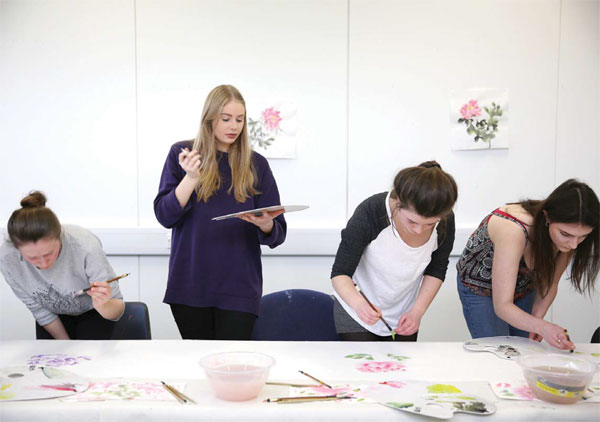Artist shares Peony's secrets
A Chinese painter's guidance opens the doors for Westerners to the beauty of Chinese culture
Jiang Hongsheng claims he has "a secret that can make people fall for traditional Chinese art at the very first sight".
The genial, bright-eyed man in a black jacket says his job is to "unravel the richness of Chinese art through brush painting", and he can do it in just two hours of painting a peony.
|
Students paint their final work on a 100-meter-long scroll after an hour's practice at their first class at Nottingham Lakeside Arts. Photos by Song Wei / China Daily |
The artist, 49, who is fluent in English, arrived in the United Kingdom at the invitation of the University of Nottingham on Jan 11 as part of Chinese New Year celebrations.
We met at his studio, where he holds workshops, on the first floor of Nottingham Lakeside Arts, and 30 of his masterpieces are displayed on the ground floor.
Jiang's approach to his brush painting class is highly unorthodox. He spends just 15 minutes to introduce the art form and to demonstrate how to paint peonies, then three-fourths of the time is given to the first-time students to paint their own.
"Here come my two secrets," he winked, about to reveal what helps first-timers finish a peony painting within one hour of learning.
First are the "three steps" - from getting the right amount of water on the brushes to blending colors and doing simple strokes and dabs, guided by Jiang's summaries from his years of teaching. The steps are an excellent walk-through for novice learners.
Secondly, Jiang always uses concise but enchanting Chinese cultural elements, such as poems and anecdotes, to inspire students' inner creativity.
"It sounds uniquely Chinese, but somehow it can trigger their imagination and they are able to find something similar in their own culture," he says.
"It's like, 'Give me a fulcrum, I shall move the world'," he says with a big smile. "I have just found the fulcrum in my students."
After a few sheets of practice paper, students are ready to do their final work on a 100-meter-long piece of xuan paper, a fine-textured rice paper on which traditional Chinese paintings are usually done.
Jiang says he came up with the idea of letting first-time students paint peonies on the 100-meter scroll just a couple of days earlier.
"Each bloom is delicate and delightful," Jiang says while looking at the half-done scroll.
Jiang says some suggested the scroll be exhibited at museums like the British Museum when it's finished. "It would be such an honor," he says.
The British students, ranging from primary school students to retirees, broke the record by finishing the painting of peonies within one hour of learning, according to Jiang. He says it usually takes his students a couple of classes to practice until the final work is done.
Sofia Nazar-Chadwick, head of audience development of Lakeside Arts, says she is amazed at the scroll of beautiful flowers.
"If you asked most British people, they would tell you, 'I can't do brush painting'. But look at what his students here have produced. It's absolutely stunning. Jack (Jiang's English name) is able to show people that they could do things that they would never have had expected to do," Nazar-Chadwick says.
She described Jiang as "a phenomenal, brilliant man who is able to bridge both cultural gaps and artistic gaps a good ambassador for Chinese culture who makes it more accessible to the West".
Stephen Green, a Web application developer and frequent visitor to Jiang's exhibitions and workshops, says: "Jack's work brought back my happy memories when I was in China 20 years ago. It also reminds us that spring is coming; we've had lot of winter here."
Jiang's mastery of English and teaching expertise is inseparable from his previous occupation.
He has a master's in English education from Zhejiang Normal University, he was a teacher of English for 22 years before developing his artistic skills working under a master artist, Yu Yiqing.
In 2012, he was presented with a National Golden Prize for Painting. Also in the same year, he set up the The Red Peony Academy in the East China port city of Ningbo.
The academy has been offering free classes in Chinese brush painting and calligraphy for foreigners in Ningbo, and has taught over 5,300 students from 160 countries.
"I hope eventually a 'butterfly effect' would take shape," Jiang says. "I hope my students can not only be an observer, a participant, but also become a friendship ambassador introducing Chinese arts to others."
The UK visit is the Red Peony Academy's debut overseas. Jiang says he is "excited and surprised to see how welcome Chinese arts are here".
On Feb 9, Jiang is to open his first workshop at Nottingham Confucius Institute Jubilee Campus, and he will also travel to Chichester University in the south.
Jiang's exhibitions and workshops will run through Feb 19 at Nottingham Lakeside Arts.
songwei@chinadaily.com.cn



















